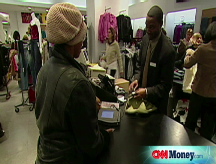Look forward, not backward
It's hard to argue with the numbers. We're probably in a recession. But the good news is we're likely closer to the end of it than the beginning.

NEW YORK (CNNMoney.com) -- Here's a shocker. We found out this morning that the economy stinks and that the stench began to emanate in the fourth quarter.
The "news" that the fourth-quarter 2007 gross domestic product was revised from up 0.6% (i.e. flattish) to a decline of 0.2% (aka flattish) should come as no surprise to anyone who tried to get a loan, went to a store, or filled up their car's gas tank in the past few months.
To many, the fourth-quarter GDP number will confirm that the economy is probably in a recession and that it began sometime last fall. That the economy grew at a sluggish pace in both the first and second quarters of this year adds more fuel to the recession argument.
With that said, it's now far more important to try and figure out just how much worse the economy will get and how much longer this slump will last than continue the debate as to whether or not this is a recession.
Fortunately, if history is any guide, we should be closer to the end of this downturn than the beginning.
According to the National Bureau of Economic Research, the group that officially makes the call on when the economy is in recession, the 10 post-World War II recessions have, on average, lasted 10 months.
So let's assume, for argument's sake, that the NBER eventually declares that this current economic crisis is a recession. (An official recession proclamation is probably several months away though -- the NBER waited until November 2001 to say that the 2001 economic recession actually began in March, after all.)
But it's plausible that the NBER could set the start date for the recession as sometime in late 2007. Let's call it November. If that's the case, and if this downturn winds up lasting a typical ten months, it will be over by September.
Given the depth of the problems in the housing and credit markets, though, it seems highly unlikely that this slump will end that quickly.
Still, the longest recessions in the post-War era were each 16 months -- the oil-induced shock of November 1973 through March 1975 and the stagflation recession of 1981 and 1982.
So even if this winds up being a historically-long downturn, odds are that it should be over by next March.
Of course, March is a long time away. And for Americans that are struggling to pay their bills, it's little consolation that we may have passed the halfway point of this slump.
Yet, if you look at closely at the second-quarter GDP report from today, there are some encouraging signs.
John Derrick, director of research for U.S. Global Investors, a San Antonio-based investment firm, notes that businesses reduced their inventories by a whopping $62.2 billion in the second quarter.
This, Derrick says, is a positive because it means corporations recognize that the housing woes and rising energy and food costs are hurting the consumer. They are not going to overproduce to try and get out of the slump, something that would ultimately do more harm than good.
"Companies are being disciplined," he said. "The drawdown of inventories sets up the economy for growth going forward."
This doesn't mean that the days of robust growth will return just yet. As we saw with the last recession in 2001, recovery can be slow, particularly in the job market.
And to be sure, Derrick isn't predicting a big bounceback.
"We're not expecting a dramatic recovery. We will kind of muddle through for the next couple of quarters," he said.
But people need to keep in mind that a recession is a cycle. We should not mistake this downturn for some sort of economic End of Days. Every time the economy hits a rough patch, the temptation is to declare that we're all doomed.
That's just not the case. The markets and economy often have to deal with major shocks. Sometimes, like the Black Monday stock plunge in 1987, the shock doesn't have a major spillover effect on the overall economy. And other times, like the dot-com bubble bursting in 2000, they lead to recessions.
The trick for investors and consumers is to hunker down to get through this, but not panic.
"Every five years or so, there seems to be a big financial crisis," says Kent Croft, manager of the Croft Value fund. "But it pays to be an optimist if you are a long-term investor. At some point, the economy and markets will turn."
I know that some of my loyal glass-is-half-empty readers (keep posting on the Talkback page!) will certainly disagree. But repeat after me: This too shall pass.
Issue #1 - America's Money: All this week at noon ET, CNN explains how the weakening economy affects you. Full coverage.
Have you had to raise cash this year for an unexpected expense? We're looking for people who got the cash by doing one of the following: Took out a home-equity loan, borrowed money from family or friends, borrowed against a retirement account such as a 401(k), sold a life-insurance policy. Is that you?
Drop us a line at realpeople@moneymail.com, and you may be spotlighted in Money magazine and on CNNMoney.com. Please tell us why you needed the cash, how much cash you raised by doing it, when you did it and if you were happy with your decision. Also please include your name, age, city, contact information and a recent family photo. ![]()




